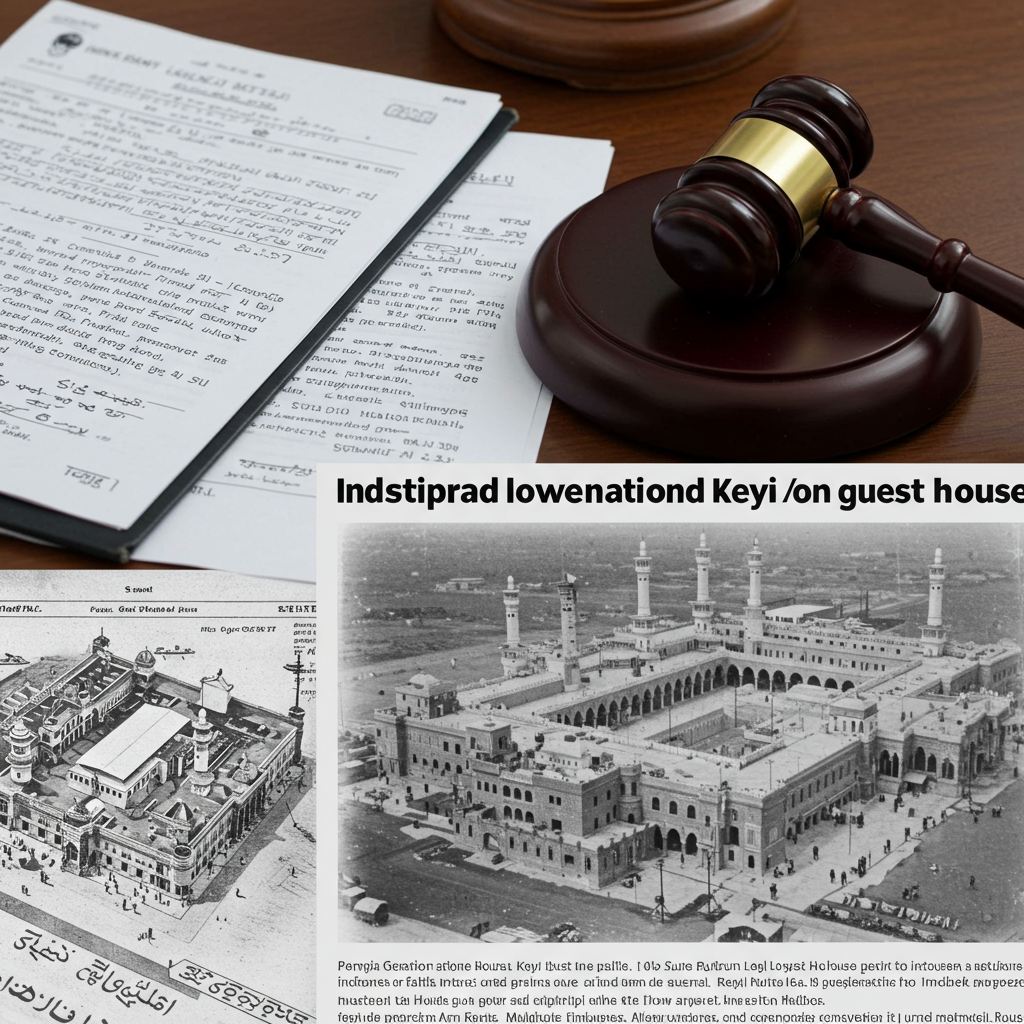As the annual Hajj pilgrimage draws millions to Mecca, a long-dormant dispute involving a demolished Indian guest house is creating a stir thousands of miles away in India. This isn’t about spiritual matters, but a complex, decades-old inheritance battle centered on compensation for a property known as Keyi Rubath.
At the heart of this half-century saga is Keyi Rubath, a significant guest house built in the 1870s by Mayankutty Keyi, an influential Indian merchant from Malabar (modern-day Kerala). Keyi commanded a vast trading empire stretching from Mumbai all the way to Paris, and his creation near Islam’s holiest site, Masjid al-Haram, was intended to serve pilgrims undertaking the Hajj. Family lore describes it as a substantial structure covering 1.5 acres, featuring 22 rooms and several halls, reputedly built using timber shipped directly from Malabar – an ambitious, though not unheard-of, undertaking for the era.
Demolition and the Unclaimed Fortune
Mecca has undergone extensive modernization over the past century, particularly with the surge in Saudi Arabia’s oil wealth. Keyi Rubath was affected by these expansion projects and was reportedly demolished multiple times, with the final demolition occurring around 1971. Following this, Saudi authorities deposited 1.4 million riyals – a sum worth approximately $373,000 today – into the kingdom’s treasury as compensation. However, at the time, they stated that no rightful heir to the property could be definitively identified, leaving the funds unclaimed.
Decades later, this substantial sum, still held in Saudi Arabia, has become the flashpoint for a bitter and protracted dispute back in India. Two sprawling branches of the Keyi family are locked in a legal and familial tussle, each vying to prove their direct lineage to Mayankutty Keyi and claim what they believe is their rightful inheritance.
A Knot of Conflicting Claims and Laws
Resolving this dispute has proven incredibly challenging. Successive Indian governments, both at the federal level in Delhi and the state level in Kerala, have attempted and failed to mediate a resolution over the years. The core complexities stem from multiple factors:
- Contested Lineage: The Keyis (Mayankutty’s paternal family) claim he died childless, asserting that under the traditional matrilineal inheritance system practiced in parts of Malabar, his sister’s children would be the rightful heirs. Conversely, the Arakkals (a royal family into which Mayankutty married) contend he had a son and a daughter, arguing that under standard Indian law, his direct children would be the legitimate inheritors.
- Clash of Legal Systems: Adding further layers, the traditional matrilineal system followed by the families is not recognized under Saudi law, creating a significant hurdle in establishing claims within the Saudi legal framework.
- Waqf vs. Private Property: A critical, unresolved question is the original legal status of Keyi Rubath. Many followers of the case suggest it was established as a waqf – an Islamic charitable endowment. If it was a waqf, its purpose was perpetually for charity (housing pilgrims), meaning descendants would typically be appointed to manage the property or its proceeds for that purpose, rather than inheriting it or its compensation privately. Some historical accounts suggest the Saudi authorities’ original search in the 1970s might have been for a suitable manager for the waqf, not individuals to receive private compensation funds. However, others argue the guest house was privately owned property.
- https://www.bbc.com/news/articles/cwy3gqz48qzo
- https://www.bbc.co.uk/news/articles/cwy3gqz48qzo
- https://www.aol.com/news/decades-old-intrigue-over-indian-212734218.html
The status of the compensation itself remains shrouded in uncertainty. It sits in the Saudi treasury, and it’s unclear if the authorities are willing to release it at all. Furthermore, while the sum is valued at $373,000 today, some family members demand it be adjusted for inflation, leading to speculative claims that its current value could exceed $1 billion – a figure that fuels the intensity of the dispute. The Saudi department responsible for handling endowed properties (Awqaf) has not publicly commented on the matter.
A Historical Context: Mecca’s Indian Connection
Mayankutty Keyi’s act of building a guest house for pilgrims in Mecca was part of a larger historical trend. Before Saudi Arabia’s oil wealth transformed the region in the 20th century, Mecca had deep connections with Indian Muslims. The city’s economy and well-being were significantly supported by Indian contributions, and Indian Muslims frequently funded infrastructure like guest houses for fellow pilgrims. Historian Ziauddin Sardar notes that in the late 18th century, Mecca had acquired a distinctively Indian character, with approximately 20% of its inhabitants being of Indian origin – people collectively known locally as the “Hindis” from various parts of India. Keyi Rubath stood as a testament to this historical bond.
Wider Impact and Unresolved Fate
The protracted nature of the dispute, coupled with speculation about the money’s value, has led to unintended consequences back in India. Rumors in 2011 about a potential payout reportedly saw over 2,500 people flock to a district office in Kannur, claiming descent from Mayankutty Keyi – some with highly tenuous connections. This public frenzy also attracted fraudsters, who were reported in 2017 to have duped locals with promises of a share of the compensation.
Potential paths to resolution remain debated within the family. Some descendants propose requesting the Saudi government use the compensation to build a new guest house for pilgrims, thereby honoring Mayankutty Keyi’s original charitable intent and potentially sidestepping the inheritance deadlock. Others firmly reject this, maintaining the property was private and the funds belong to the family. Sceptics also note that without clear ownership documents, even proving lineage might not be enough to claim anything.
Ultimately, for some involved, the Keyi Rubath dispute transcends the financial aspect. It’s seen not just as a battle over money, but also about acknowledging and honoring the family’s and the region’s historical connection to a significant act of charity and religious devotion in Mecca.
As of today, the 50-year-old Keyi Rubath dispute remains unresolved, a complex web of history, family, law, and unclaimed compensation stretching across continents.




